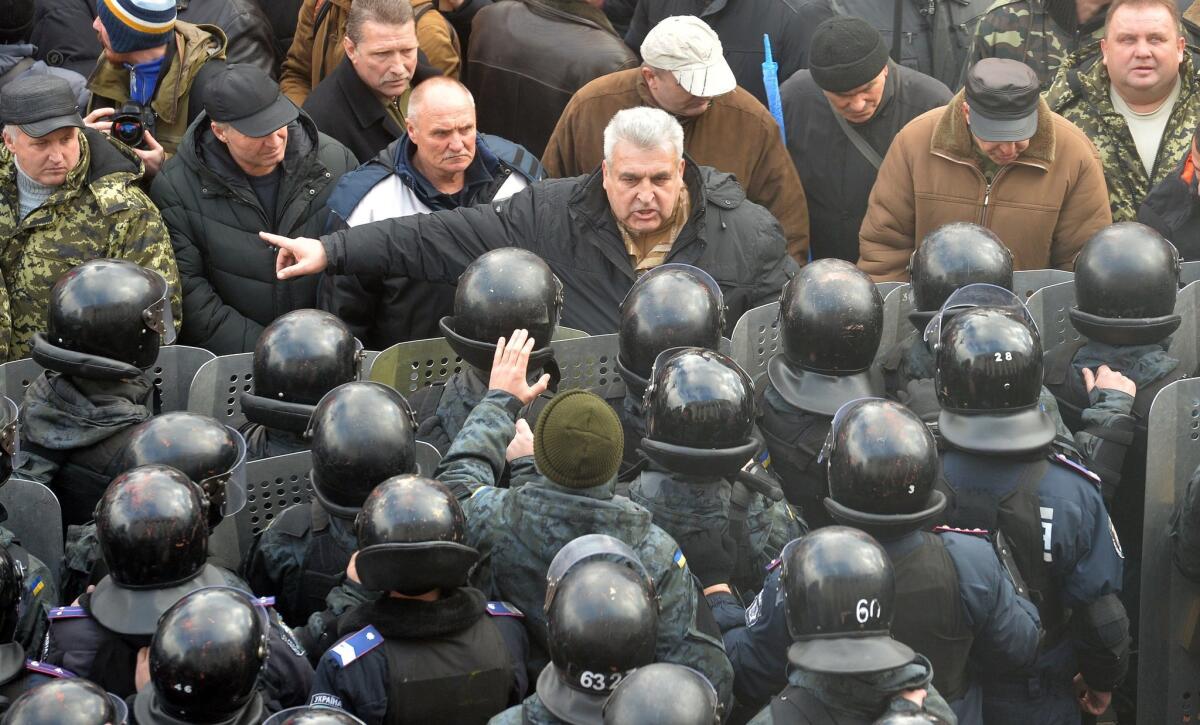Ukrainian lawmakers vote to end nation’s nonaligned status

- Share via
Reporting from Kiev, Ukraine — The Ukrainian parliament voted Tuesday to end the nation’s nonaligned status in the face of Russian aggression, angering Moscow and potentially opening the way to NATO membership in years to come.
The nonaligned policy, a vestige of the nation’s closer relations to Russia under now-deposed President Viktor Yanukovich, was the principal factor in allowing Moscow to seize the Crimea peninsula in March and to abet the subsequent rebellion in eastern Ukraine, said lawmaker Yuri Bereza.
“If Ukraine had moved to join NATO right after the breakup of the Soviet Union, Russia would have never dared to deploy its troops in Crimea, annex the peninsula and then incite, supply troops and hardware for an armed mutiny in Donbass,” Bereza said in an interview after 303 members of the 450-seat parliament voted to support the move.
“Now it is up to us to conduct necessary military and political reforms to join the [North Atlantic] alliance,” he said.
Bereza, who formerly led a militia battalion in the fight against pro-Russia insurgents in the east, expressed hope that Ukraine might join NATO in three years, although Ukrainian President Petro Poroshenko previously said his nation would not be in shape to join the alliance before 2020.
“That will be our iron-clad guarantee against a new Russian aggression,” said Bereza, who was wounded in battle in August.
The armed conflict in eastern Ukraine has claimed more than 4,700 lives and caused hundreds of thousands of people to flee their homes. Large areas in the Luhansk and Donetsk regions, including both capitals, remain under control of the separatists.
The vote Tuesday demonstrated Ukraine’s “choice in favor of freedom and security,” Foreign Minister Pavlo Klimkin said at news conference in Kiev.
“Today we are working with our allies and NATO secretariat to establish a new annual national program which will fulfill these reforms,” Klimkin said. “Our key priority will be to reach all the standards necessary to reform not only the security and defense sector but also all the standards which a democratic country should have to ensure Euro-Atlantic integration.”
His Russian counterpart, Sergei Lavrov, condemned the decision.
“It is counterproductive as it only enhances the confrontation by creating an illusion that the adoption of such laws can resolve the deep internal state crisis in Ukraine,” Lavrov said in a statement posted on the Russian Foreign Ministry’s website shortly after the vote.
“It would be much more productive and balanced to at last start a dialogue with that part of their own people who stayed completely ignored when a state coup was carried out,” he added, referring to the overthrow of Yanukovich in February after three months of protests against his pro-Russia policies.
The parliament’s decision and Lavrov’s remarks came on the eve of talks in neighboring Belarus between the Ukrainian government and the separatists.
The decision was “a negative step,” Denis Pushilin, deputy speaker of parliament in the separatists’ self-declared Donetsk People’s Republic, told RIA Novosti news agency. “The chosen direction does not correspond with the interests of Ukrainian people.”
Parliament’s move was necessary but could jeopardize the talks in Belarus and complicate relations with Russia for years, said Ihor Popov, a Ukrainian lawmaker.
------------
FOR THE RECORD
Dec. 23, 11:20 a.m.: An earlier version of this article gave the name of a Ukrainian lawmaker as Ihor Rogov. His name is Ihor Popov.
------------
“It was a long-expected political decision which opens up legal possibilities for Ukraine to join NATO, but we must realize that this may not happen tomorrow or in the near future,” Popov, who is also president of Kiev-based Politika Analytical Center, said in an interview. “But at the same time it is clear signal to the Kremlin that in the face of ill-concealed Russian aggression, Ukraine will seek its security in the company of Western countries rather than succumb to Russia’s pressure.”
If Ukraine’s political elite appeared to be more or less united on the issue of the country’s relations with NATO, a recent public opinion poll conducted jointly by the Democratic Initiatives Foundation and Kiev International Sociology Institute showed that the Ukrainian people remained divided: 43.6% of respondents supported joining NATO, 14.8% supported a military alliance with Russia and 22.2% still favored the nonaligned status.
“I don’t understand why we need NATO,” Lidiya Kovalchuk, 54, a social worker from Odessa, said in a phone interview. “We are at war with Russia, with the number of casualties and refugees growing by the day. NATO will not accept us anyway, but [Tuesday’s vote] will further anger the residents of the east.”
Special correspondent Butenko reported from Kiev and Times staff writer Loiko from Moscow.
More to Read
Sign up for Essential California
The most important California stories and recommendations in your inbox every morning.
You may occasionally receive promotional content from the Los Angeles Times.










